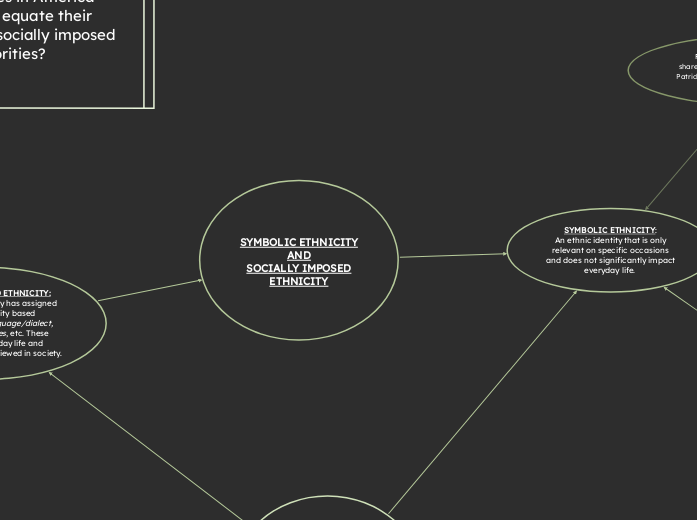Floating topic
An example of these differences is when Black and White young adults are around 18 to 22 years old and in college, discovering their identities on their own.
Black Americans, Hispanic Americans,
Asian Americans, and Native Americans
do not have the option of a symbolic
ethnicity in present-day America, they experience a socially imposed ethnicity.
Ethnicity matters to, and affects, a great deal to these groups, whereas ethnicity doesn't matter to or affect White Americans.
SOCIALLY IMPOSED ETHNICITY:
This means that society has assigned
them their ethnicity based
on their cultures, language/dialect,
physical appearances, etc. These
things affect everyday life and
how these groups are viewed in society.
Conclusion:
White Americans equating their individualistic symbolic identities to the socially imposed identities of minorities in America is in fact harmful. Doing so enforces harmful stereotypes and, in a way, momentarily erases the history behind every socially imposed race and ethnicity. White Americans have not experienced other-ness, being a minority, or even discrimination on a level American minorities feel, therefore should not try to equate their identity to those who have.
They can, however, make space for people who have different identities and treat them respectfully and take the time to listen and learn, how the minorities have had to do for them their whole lives.
If White Americans assume everyone's ethnic experience is the same as theirs, enjoyable and optional, then they will be completely ignoring the hardships and struggles Black Americans, for example, go through such as discrimination and racism.
Without acknowledging the hardships and racism, White Americans end up using harmful stereotypes towards Black Americans because for them it shouldn't be taken negatively.
White Americans who adopt a
symbolic ethnicity tend to think that
all identities/ethnicities are interchangeable; this assumption ignores the very big difference between an individualistic symbolic ethnic identity and a socially enforced and imposed racial identity.
Waters, Mary C., Optional Ethnicity: For Whites Only? p. 201
White Americans equating their individualistic symbolic identity obscures the fact that Whites and non-Whites have been treated wildly different in the U.S. and that the current identities of individuals partly reflect that unequal history.
Waters, Mary C., Optional Ethnicity: For Whites Only? p. 202
The identity development of Black students is more complicated because of the added element of racial discrimination and racism.
The ethnicity White students claim is more often than not symbolic and associated with enjoyable and intermittent characteristics.
Research Question:
Is it harmful to minorities in America
for White Americans to equate their
symbolic ethnicities to the socially imposed ethnicities of minorities?
For example, those who identify as Irish
share a symbolic ethnicity, they only celebrate St. Patrick's Day and don't do things like strictly marry Irish or live in Irish neighborhoods.
Waters, Mary C., Optional Ethnicity: For Whites Only? p. 200
Only White Americans are
capable of having this "choice"
to identify as either White, American
or as a European ethnic group.
This is because they are the majority
group in terms of holding political
and social power.
Waters, Mary C., Optional Ethnicity: For Whites Only? p. 199
SYMBOLIC ETHNICITY
AND
SOCIALLY IMPOSED
ETHNICITY
SYMBOLIC ETHNICITY:
An ethnic identity that is only
relevant on specific occasions
and does not significantly impact
everyday life.









